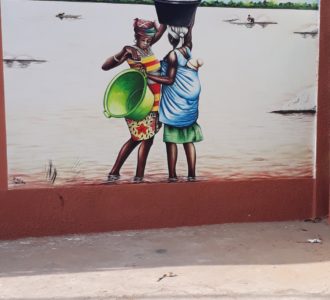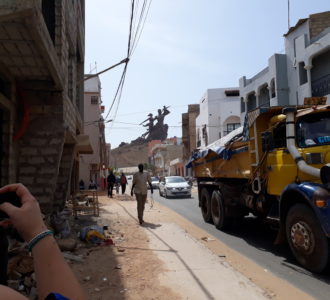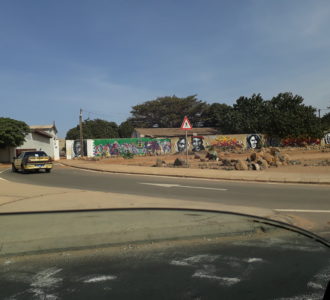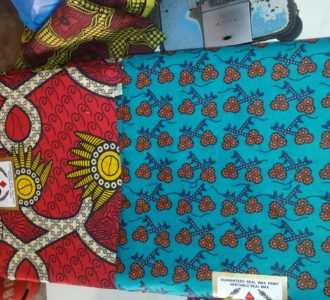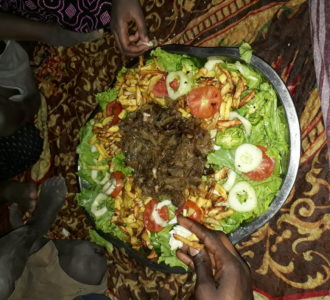Kwanzaa in Senegal
Unfortunately no, there were no Kwanzaa celebrations going on in the Theis or Touba Toul areas that I knew of. This is the first year in my life that I’ve ever missed a Kwanzaa celebration, but Senegal isn't a bad place to be missing it. Many people incorrectly believe that Kwanzaa is a traditional “African” holiday however it was created by Doctor Maulana Karenga, an African American, in the 1970s as a platform for the diaspora to reach back to it’s African roots. Athough Kwanzaa isn't celebrated here the seven principals of Kwanzaa can still be clearly seen in motion here in Senegal . The seven principals or the Nguzo Saba represent the seven days in which Kwanzaa is celebrated. The philosophies were originally set in place by our ancestors and serve as a guide map that all Africans of the Diaspora can follow. During my four months here I've been able to witnesses these principals followed, in essence Senegalese people are indirectly celebrating Kwanzaa.
Umoja-Unity
Umoja is the first principal and first day of Kwanzaa, it's Ki Swahili for Unity. On the first day we reflect on our success and failures to unify and come together as one to overcome any obstacles we face. The concept of Umoja is practiced on a daily basis in Senegal. All meals except for breakfast are eaten from one huge single bowl and it is polite to slice the fish in the middle and pass it to another person so that everyone can taste it. Also whenever there is someone walking by a family eating lunch everyone will aggressively yell “Hey you! Come eat lunch with us!” and whenever someone has eaten enough and attempts to leave the bowl every one will say “eat eat eat!” This insures that no one goes hungry and everyone is satisfied. A few weeks ago I accidentally missed lunch at my house, so my host brother simply went to another house and brought me some of their food. The concept of sharing is on a while new level and no one is afraid to walk into a house they don't know and eat there.
Kujichagulia- Self Determination
The biggest example self determination I've seen in Senegal is the will to travel between major cities via any mode of transportation humanly possible. When traveling to main cities such as Theis and Khombole you can see Senegalese people using anything with wheels to get to their destination. People use extremely old cars, buses,horse carts, donkey carts, camels,bikes,motorcycles,scooters,manual wagons,and of course their feet. Often times you'll see three or four men sitting on the roof of a bus and hanging outside the bus. Men and women will pile themselves and their belongings onto a motorcycle and magically make prehistoric buses and cars run somewhat “smoothly” on the road. The desire to move between city to city by any means necessary is a huge example of Kujichagulia in Senegal.
Ujima- Collective Work and Responsibility
Ujima is shown through something called the Nuyo culture in Senegal. Nuyo is the Wolof word for greetings and although these greetings can be long and drawn out they let people know that you are an active part of the community and you care about the general safety and well-being of everyone. The most common greetings are; How are you?(Na nga def) How/Where is your mother? (Ana sa yaay) Is your mother in peace? (Mungi ci Jaam) How is your job going? (Nakka sa liggye bi) Where is your friend? (Ana sa xarit) Are you in peace? (Yangi ci Jaam?) Whenever you walk by someone in the village it is imperative that you greet them with these questions and that they do the same to you. It's also important to know the whereabouts of the people in your family and friends so that when the person ask you can respond accordingly; for example if you are asked “where is your friend?” and you respond “I don't know” you won't be considered a good active member of the collective community.
Ujama- Cooperative Economics
The best fabrics, fruits, jewlry and seasonings are all brought out in the Saturday market in Touba Toul. People come from all over the Theis region to support the local entrepreneurs and farmers and get quality goods for a good price! Almost everything you need can be bought from the native Senegalese producers and you rarely find yourself needing to go outside your community to find things you need. This market also allows the entrepreneurs to have a steady and consistent income.
Nia- Purpose
I have seen Nia throughy practiced through the will and drive for Senegalese people to study and in particular learning multiple languages. The average Senegalese person speaks either Wolof or Serrer along with French, Arabic, English and even Spanish. The need to know multiple languages is really important to Senegalese and it is very rare to find someone who can’t at least speak two languages. They are eager to teach and learn from different people and they are correct in concluding that language is the key to do this.
Kuumba- Creativity
My mini obsession with Ankara style fabrics has been thoroughly satiated in Senegal. In early December I had a decent stack of fabrics waiting to be tailored. The Senegalese fashion scene is untapped and sheer variety of silks and velvets show the desire for Senegalese to look their absolute best. Kuumba is also show through the “Alhumdulilah” buses. These funky buses are decked out with art and murals of important religious figures.
Imani- Faith
The third largest migration in the world occurs in Senegal. It's called Magal Touba and it is the celebration of Cheick Ahmadou Bamba an important Spiritual and Anti-Colonialist leader. Millions of Muslims from all over the world come to celebrate him by praying in his holy city Touba. The love for the Cheick is blatant, in fact you can't walk two feet without seeing a mural, picture, or a T-Shirt with his image. The Senegalese people continue to bring his image and legacy into the future, they show us that as long as we have faith and represent our ancestors they never truly die.
I hope all communities of the Diaspora enjoyed their Kwanzaa this year and practice the principals year round. Athough it isn't celebrated here the love can be spiritually felt and is being reciprocated. To the black communities of Atlanta and Birmingham thank you for teaching me and making Kwanzaa such a beautiful part of my childhood. Please continue to positively represent the motherland as we go into this new year. Asé!

